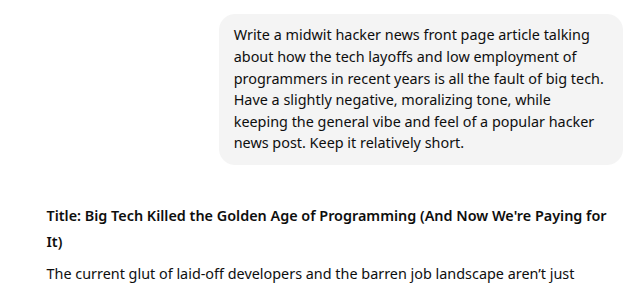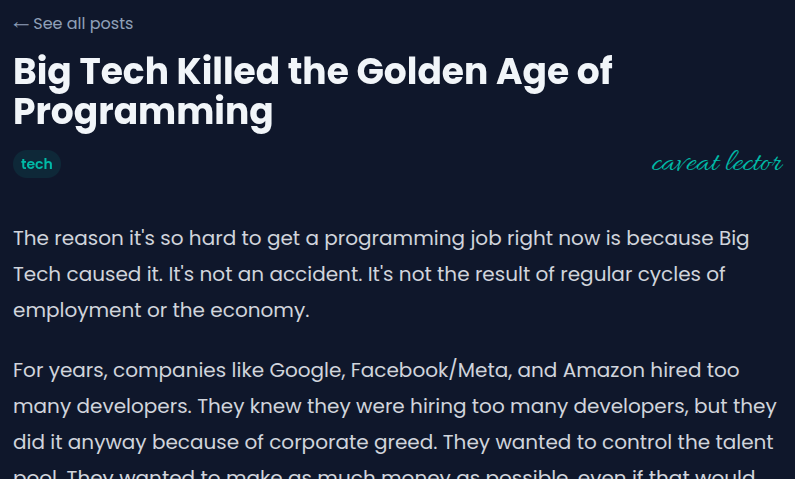How I Made the Front Page of Hacker News with AI Slop
This is a story of how, in trying to prove something about Hacker News, I ended up learning something about myself. But first, some foreshadowing:

After my recent post about comment etiquette1 got zero comments, I was disappointed. I put more effort into it than the post before it, but the post floundered. The title was partly in Latin, so fair enough. I guess if it’s written in Latin, it’s probably boring, so nobody clicked.
I was disheartened, because I really believed the post was interesting, but nobody else seemed to agree. I enjoyed writing it, and for some people, maybe that’s enough. But I found it disappointing that I had tried to write something thoughtful and interesting that I hoped other people would see the value in, and it vanished without a ripple.
In the throes of my discouragement, I got the idea for a little experiment. I had ChatGPT help me write a fake post. The post was titled “Big Tech Killed the Golden Age of Programming”, which is a pandering, sycophantic post about how unfair it is that we all lost our jobs. It says nothing that anybody doesn’t already know.
Unlike my normal articles which are 100% carbon-based, I had AI help me write the article. I asked it repeatedly to dumb down the wording, remove complex prose, and make it controversial and ranty enough to invite argument. I modified what the AI spit out a bit, but didn’t tangibly change much.

I did this as an experiment. So far, I have written blog posts that are about ideas I find personally interesting, like Stoicism2 or language3. Generally not mainstream, popular tech topics. They do about as well as you’d expect when I bother posting them to Hacker News at all, which is only a minority of the time, because silence is discouraging. They don’t get much attention. And I believed the main reason was a lack of merit. If I had done a better job writing them, I thought, then more people would have read them.
But I was proud of my Caveat Lector post. And nobody commented at all! This made me feel on some level like my understanding of why my posts were failing was incorrect somehow. So I decided to run an experiment. What if I write a post that completely stinks, but it’s about a popular topic and has an attention-grabbing, ranty tone? Would that be enough to get more attention?
At the time I am writing this, I do not yet know. I haven’t yet published Big Tech Killed the Golden Age of Programming. I suspect it will get more than zero comments. But will it be 2-3, or more? And will the general vibe of the comments be positive, or negative? It’s hard to get anything more out of a Hacker News audience than a slightly negative, complaintive, nitpicky response anyway, but I suspect the response will be mostly negative.
I expect people will probably recognize how lazy the post is and they’ll disagree with many of its points, but that won’t matter, because they read it and they’re commenting on it. People say the currency of our modern discourse is no longer reputation, but attention. Maybe they’re right.
Time to post it and find out.

(Update: I am now writing hours after having posted the shitty blog post to Hacker News.)
Well. WELL. There were two ways this could have gone, and I had two versions of the rest of this blog post planned out in my head. If the post had flopped, then the rest of this post would have essentially been a mea culpa, admitting that the Hacker News immune system works better than I gave it credit for. I would have then gone on to talk about how the internet in general does a better job of surfacing high-merit content than did in past. In the early Youtube days, the right tags or thumbnail could propel you to success. But now, people generally agree that the content people want rises to the top. As Mr. Beast said, “Just make videos that people want to watch.” Then, the post would have concluded that the best way to be successful in the online world is to develop yourself and your skills and make the best things you can. I think it would have been a nice conclusion to this post.
Unfortunately, we don’t live in that world. Within an hour, my post had over a hundred comments and was one of the top ten posts on the front page of Hacker News.
My experience of this happening was essentially pure shock. I did not anticipate this happening to me. The attention burned against my social anxiety. Nothing I posted had ever been remotely this popular. My heart was literally pounding in my ears. I had anticipated at most a moderate response of maybe 20 comments for my silly little experiment. But now I had hundreds of people commenting. Saying nice things. Saying nasty things.
I think the majority of comments were “on-topic”, essentially responding to the topic visible in the title “Big Tech Killed the Golden Age of Programming”. These kinds of comments are generally the most valuable comments on Hacker News — people simply sharing their thoughts about a subject.
Many other comments pointed out the fact the article was lazy, poorly written, or poorly argued. Only two explicitly mentioned the possibility that it had been written by an LLM or otherwise had been posted in bad faith.4 More were willing to attribute the article to my personal rage or disappointment with my career, saying I didn’t “appear to have any industry experience whatsoever”, was “stuck at a no-name dev shop”, or was an “HTML Jockey who gets to call himself ‘full-stack’ because they let him run the mysql server”. Ouch. Not easy to be on the receiving end of when you’re not used to internet attention, or really any attention at all.5
My prediction about the attitude people would have toward the article was generally correct. But attitude was not the dependent variable in this experiment — attention was. And I dramatically underestimated the amount of attention people would give it. How was I so wrong? And what can I learn from it? The response to this article completely surprised me, so clearly my model of reality was off.
First, I want to clarify that I know this experiment was not a science experiment. My goal was not to prove anything about Hacker News, like how foolish and easy to manipulate everyone is, or anything like that. It was a personal experiment, motivated by some combination of disappointment and curiosity. Clearly something was not working about the way I was interacting with reality, and I wanted to know what.
That said, I am surprised just how many people felt the need to comment on something they believed was low quality trash. Could they simply not help themselves? Was the topic itself just so interesting? I think I couldn’t have chosen a topic that had been beaten to death more than this one, so I’m not sure that’s it. I think maybe when logical people see something they perceive as incorrect, they often can’t help themselves but to jump in and correct it, even if those same people probably would not, upon reflection, endorse their participation in such a pointless discussion. I mean, do we really need a ten thousandth discussion about tech hiring, and zero discussions about the problem of undertranslation?6
I didn’t understand why my posts would get ignored, yet the same tired topics were immortal — horses impossible to beat to death. I think this experiment has given me a better understanding. Now I realize: People give their attention not to what deserves it most, but to that which does a good job capturing it. Whether by good means or bad.
Sounds obvious, though it wasn’t to me. And, taken cynically, it would imply that I should abandon writing about my genuine interests and just start churning out lazy posts that optimize for clicks and mimic whatever’s currently viral.
But like most of you, I could never do that. That’s no way to live. Ultimately, I’m not being paid to write this blog. It’s a form of self-expression. But I think there is still something important for me to learn here. I think my current approach to writing and self-expression has been wrong, actually.
Maybe the correct amount of intentional attention-seeking is not 0%.7 Maybe it’s, like, 30%. Maybe it’s a mistake to churn out attention-seeking clickbait, but maybe it’s also a mistake to write without even attempting to take into account what people find interesting. Maybe it’s a mistake to write something nobody reads.
I’ll leave solving that dilemma to the philosophers, but personally I think writing is communication, and shouldn’t you take into account the interests of the audience you’re communicating with? Should a teacher not tailor their curriculum to the interests of their students? Especially in an era where AI slop is going to become better and better at capturing attention, shouldn’t we humans try to do a better job standing out?
I think, going forward, I’m going to try to strike a better balance between writing about things I’m passionate about, and writing in a way that will pique people’s interest and perhaps help them share in my passion. That’s my takeaway. I hope you all can forgive my little experiment, and I hope it leads to a productive discussion :)
P.S. I just wanted to say: I was on the receiving end of a lot of nastiness and pettiness. The exact behaviour I called out in my recent post on comment etiquette8. But I also saw a lot of people coming to my defense. People insisting on grace and compassion even in the face of something they disagreed with. I’d just like to say thank you to those people. You are the reason I read Hacker News, and I strive to be more like you.9
Footnotes
-
Caveat Lector - A Generic List of Caveats For Any Essay or Article ↩
-
Stop Naming Adages After People and Calling Them Laws for example. ↩
-
Though I expect now everyone will say they knew all along and it was obvious! ↩
-
I don’t feel the need to defend the quality of my career other than to say that I am happy with my current job, I feel like I am not stagnating as a developer, and I am not currently looking for anything better. ↩
-
Or 5%. I have historically tried to make my titles attention-grabbing, at least as best as I could given the subject matter. ↩
-
Caveat Lector - A Generic List of Caveats For Any Essay or Article. This is now linked at the top of each of my posts, not that I think it will actually help with the comments I receive. It’s more of a statement of my commitment to productive discourse. ↩
-
I usually don’t comment much because of fear of negativity, but I will at least try to upvote things I see as charitable. And who knows, maybe I’ll get over that fear with time. ↩